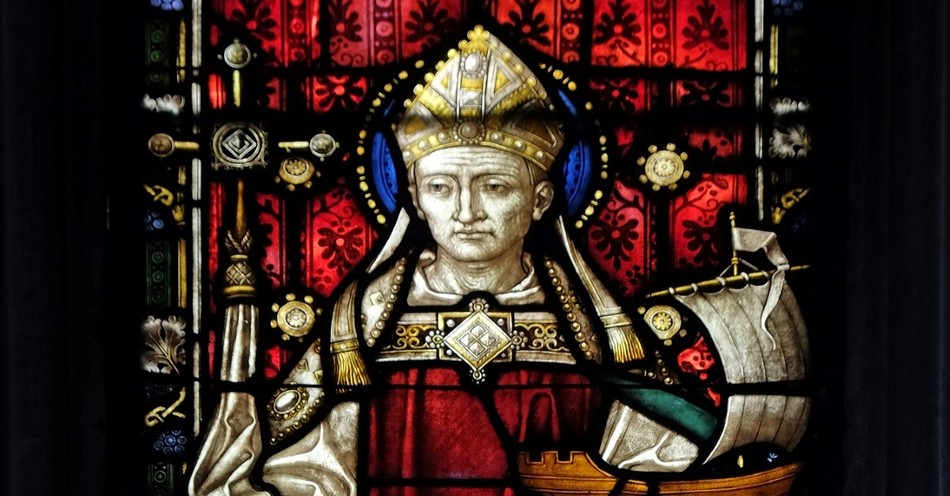St. Anselm of Canterbury (Born in either 1033 or 1034 AD, died in 1109 AD) has a strong claim to being one of the most important thinkers in Christian history. His reflections on God and the spiritual life continue to impact millions of Christians and non-Christians alike.
In the following articles, Dan Graves looks at the key moments in Anselm's life: his appointment as archbishop, and the philosophical argument that made him famous.
Table of Contents
- Rockingham Council Cut Anselm
- Anselm's Subtle Proof of God's Existence
- 5 Inspiring Quotes by Anselm of Canterbury
Rockingham Council Cut Anselm
In the eleventh century, when the papacy split between pope Urban II and antipope Clement, it affected the whole Christian world, including faraway England. King William Rufus, in a moment of serious illness, "repented." He compelled Anselm to become Archbishop of Canterbury. Later, he regretted this choice. When Anselm asked for permission to obtain his pallium (a white, woolen band indicating high church authority) from the pope, William asked which pope. "Urban, of course," said Anselm.
Seeking a quarrel with the scholarly archbishop, the king said that it was not the archbishop's decision to choose who would be recognized as pope by England. Anselm might as well try and take the crown from him! Anselm defended himself as best he could. He said that he could loyally serve both pope and king, and persuaded William to summon a council of bishops and nobility to resolve the issue.
On this day, March 11, 1095, the bishops and nobles met in Rockingham. The king maneuvered behind the scenes. Anselm himself addressed the assembly. "My brethren, Sons of the Church of God, for so I call all you who are assembled here in the name of the Lord, please pay attention and on the question which you have been convened to discuss give to the best of your ability the help of your considered opinion." He reminded the bishops that when he was forced to become Archbishop, he had plainly declared his allegiance to Urban. "At that time, no one had a complaint against me," he protested.
Now he asked them to "examine whether it be possible for me, while retaining allegiance to the King, to keep obedience to the Apostolic See." He added, "To me it is a terrible thing to show disrespect to and disown the Vicar of St. Peter; a terrible thing, too, to transgress the allegiance which under God I have promised to maintain to the King; terrible most of all to be told that it will be impossible for me to be true to one of these loyalties without being false to the other."
The nobles and bishops feared William too much to stand with Anselm. Anselm declared he would yield to Caesar what was Caesar's and to God what was God's. The bishops turned against him, refusing to bear his reply to the king. They urged him to yield, pointing out that Urban was too far away to help him. When Anselm could not be turned from his determination and no accusations or arguments stood up to his wise answers, the king renounced him as Archbishop and required everyone else to do the same. The bishops complied, but the nobles put them to shame by refusing to follow their quisling example.
William secretly obtained the pallium and tried to browbeat Anselm into receiving it from his hand. Anselm would not give in. Eventually, the king had to allow a bishop to take the pallium to Canterbury and lay it on the altar, where Anselm, as highest clergyman in the land, placed it on himself, demonstrating that his authority came from the church, not the king.
Bibliography:
- "Anselm, St." Dictionary of National Biography. Edited by Leslie Stephen and Sidney Lee. London: Oxford University Press, 1921 - 1996.
- "Anselm, St." The Oxford Dictionary of the Christian Church. Edited by F. L. Cross and E. A. Livingstone. Oxford, 1997.
- Dark, Sidney. Seven Archbishops. London: Eyre & Spottiswoode, 1944.
- Eadmer. The Life of St. Anselm, Archbishop of Canterbury. Edited with introd., notes, and translation by R.W. Southern. New York: T. Nelson, 1962.
- Hook, Walter Farquhar, 1798-1875. Lives of the Archbishops of Canterbury. London, R. Bentley, 1865 - 1884.
- McKilliam, Annie E. A Chronicle of the Archbishops of Canterbury. London: J. Clarke, 1913.
- Rigg, J. M. St. Anselm of Canterbury, a chapter in the history of religion. London: Methuen & co., 1896.
- Rule, Martin. The Life and Times of St. Anselm: Archbishop of Canterbury and Primate of the Britains. London: Kegan Paul, Trench, 1883.
- Various encyclopedia and internet articles.
Last updated May, 2007.
("Rockingham Council Cut Anselm" by Dan Graves, MSL, first published on Christianity.com on April 28, 2010)
Anselm's Subtle Proof of God's Existence
When St. Anselm died on this day, April 21, 1109, the church was poorer by a great mind and England by a zealous reformer. Anselm won a name for reform because he attempted to end abuses such as the slave trade. He urged the holding of regular synods and, while he was archbishop, enforced clerical celibacy within his see. Because of his powerful intellect, some scholars consider him one of the creators of scholasticism. But his most notable gift to history was what has become known as the ontological proof for the existence of God.
Can the existence of God be proven? Anselm thought so. Modern philosophers and theologians disagree. However, it is Anselm's argument, the ontological proof, which remains the most troublesome for them to disprove.
Anselm's argument went something like this: When we discuss the existence of God, we define him as a perfect being, greater than anything else which can be conceived. If God does not exist, then the name "God" refers to an imaginary being. This makes the definition of "God" contradictory, for to be real, to be living, to have power is greater than to be imaginary. It is clear I cannot even discuss the word "God" as defined if he does not exist, because I have to conceive of him as really existing in order for him to be greater than anything else, for a God who does not exist is not greater than anything else.
In short, no philosopher can legitimately argue that God does not exist if he defines God as a perfect being greater than any which can be imagined; for to be perfect, God must have real existence. Those who acknowledge He exists do not have a problem with self-contradiction when they affirm his existence. Since we can indeed raise the question of God's existence and argue the point, then God must exist. Bertrand Russell, one of the greatest logicians and mathematicians of the Twentieth Century, no friend of Christianity, grappled with Anselm's proof and at one time is said to have thought the proof worked.
As Archbishop of Canterbury, the zealous Anselm struggled with King William for church rights. He was exiled. Similar conflict would shortly afterward lead to the murder of Becket. As a theologian, the pious Anselm is remembered for his book, Why Did God Become Man? In it he argued that each of us has run up such a debt of sin that there is no way we can repay God. Christ, as infinite God, has merit enough and to spare to pay our debts. As a scholar, the learned Anselm argued that we must believe in order to understand. We could restate his insight in modern terms like this: truth only begins to come clear when one is committed to it. You cannot see around a bend in a trail unless you walk toward it.
Anselm died surrounded by friends who placed his body in ashes on the floor. He was probably canonized in 1494, although there is debate whether this occurred at all. His beatific status aside, Anselm will long be remembered as the author of the ontological proof.
Bibliography:
- "Anselm, St." Dictionary of National Biography. Edited by Leslie Stephen and Sidney Lee. London: Oxford University Press, 1921 - 1996.
- "Anselm, St." The Oxford Dictionary of the Christian Church. Edited by F. L. Cross and E. A. Livingstone. Oxford: Oxford University Press, 1997.
- Copleston, Frederick. A History of Philosophy. Westminster, Maryland: Newman Press, 1953-
- Dark, Sidney. Seven Archbishops. London: Eyre & Spottiswoode, 1944.
- Dictionary of the History of Ideas. Scribner's, 1974.
- Eadmer. The Life of St. Anselm, Archbishop of Canterbury. Edited with introd., notes, and translation by R.W. Southern. New York: T. Nelson, 1962.
- Hook, Walter Farquhar, 1798-1875. Lives of the Archbishops of Canterbury. London: R. Bentley, 1865 - 1884.
- McKilliam, Annie E. A Chronicle of the Archbishops of Canterbury. London: J. Clarke, 1913.
- Rigg, J. M. St. Anselm of Canterbury, a chapter in the history of religion. London: Methuen & co., 1896.
- Rule, Martin. The Life and Times of St. Anselm: Archbishop of Canterbury and Primate of the Britains. London: Kegan Paul, Trench, 1883.
- Runes, Dagobert D. A Treasury of Philosophy. New York: Philosophical Library, 1945.
- Russell, Bertrand. Wisdom of the West. New York: Fawcett, 1964.
- Various encyclopedia and internet articles and references in histories of philosophy.
Last updated April, 2007.
("Anselm's Subtle Proof of God's Existence" by Dan Graves, MSL, first published on Christianity.com on April 28, 2010)
5 Inspiring Quotes by Anselm of Canterbury
By Christianity.com Editorial Staff
"We bring before Thee, O Lord, the troubles and perils of people and nations, the sighing of prisoners and captives, the sorrows of the bereaved, the necessities of strangers, the helplessness of the weak, the despondency of the weary, the failing powers of the aged. O Lord, draw near to each; for the sake of Jesus Christ our Lord. Amen."
"O fountain of love, love Thou our friends and teach them to love Thee with all their hearts, that they may think and speak and do only such things as are well-pleasing to Thee; through Jesus Christ our Lord. Amen."
"O merciful God, fill our hearts, we pray Thee, with the graces of Thy Holy Spirit, with love, joy, peace, long-suffering, gentleness, goodness, faith, meekness, temperance. Teach us to love those who hate us, to pray for those who despitefully use us, that we may be the children of Thee our Father, who makest Thy sun to shine on the evil and on the good, and sendest rain on the just and on the unjust. In adversity grant us grace to be patient; in prosperity keep us humble; may we guard the door of our lips; may we lightly esteem the pleasures of this world, and thirst after heavenly things; through Jesus Christ our Lord. Amen."
"O Lord our God, grant us grace to desire Thee with our whole heart, that so desiring, we may seek and find Thee; and so finding Thee we may love Thee; and loving Thee we may hate those sins from which Thou hast redeemed us; for the sake of Jesus Christ. Amen."
"O Lord Jesus Christ, our redemption and our salvation, we praise Thee and give Thee thanks; and though we be unworthy of Thy benefits, and cannot offer unto Thee due devotion, yet let Thy loving-kindness fill up that which our weakness endeavoureth. Before Thee, O Lord, is all our desire, and whatsoever our heart rightly willeth, it is of Thy gift. Grant that we may attain to love Thee even as Thou commandest. Let not Thy gift be unfruitful in us. Perfect that Thou hast begun, give that which Thou hast made us to long after, convert Thou our lukewarmness into fervent love of Thee; for the glory of Thy holy name. Amen."
Taken from Prayers of the Middle Ages: Light from a Thousand Years edited by J. Manning Potts.
Many of Anselm's prayers, major essays, and letters are included in the book Anselm of Canterbury: The Major Works.
Photo Credit: Getty Images/ZvonimirAtleti









